|
|
|
Sort Order |
|
|
|
Items / Page
|
|
|
|
|
|
|
| Srl | Item |
| 1 |
ID:
107532


|
|
|
|
|
| Publication |
2011.
|
| Summary/Abstract |
Several prominent human rights treaties seek to minimize violations during emergencies by authorizing states to "derogate"-that is, to suspend certain civil and political liberties-in response to crises. The drafters of these treaties envisioned that international restrictions on derogations, together with international notification and monitoring mechanisms, would limit rights suspensions during emergencies. This article analyzes the behavior of derogating countries using new global data sets of derogations and states of emergency from 1976 to 2007. We argue that derogations are a rational response to domestic political uncertainty. They enable governments facing serious threats to buy time and legal breathing space from voters, courts, and interest groups to confront crises while signaling to these audiences that rights deviations are temporary and lawful. Our findings have implications for studies of treaty design and flexibility mechanisms, and compliance with international human rights agreements.
|
|
|
|
|
|
|
|
|
|
|
|
|
|
|
|
| 2 |
ID:
107533
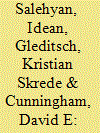

|
|
|
|
|
| Publication |
2011.
|
| Summary/Abstract |
Many rebel organizations receive significant assistance from external governments, yet the reasons why some rebels attract foreign support while others do not is poorly understood. We analyze factors determining external support for insurgent groups from a principal-agent perspective. We focus on both the supply side, that is, when states are willing to support insurgent groups in other states, and the demand side, that is, when groups are willing to accept such support, with the conditions that this may entail. We test our hypotheses using new disaggregated data on insurgent groups and foreign support. Our results indicate that external rebel support is influenced by characteristics of the rebel group as well as linkages between rebel groups and actors in other countries. More specifically, we find that external support is more likely for moderately strong groups where support is more likely to be offered and accepted, in the presence of transnational constituencies, international rivalries, and when the government receives foreign support.
|
|
|
|
|
|
|
|
|
|
|
|
|
|
|
|
| 3 |
ID:
107535
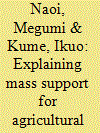

|
|
|
|
|
| Publication |
2011.
|
| Summary/Abstract |
Why are citizens in advanced industrialized countries willing to accept high prices for agricultural products? Conventional wisdom suggests that agricultural interests secure government protection because producers are concentrated and better politically organized than diffused consumers. Due to its focus on producer capacity for collective action, however, the literature fails to account for the high levels of mass support for agricultural protectionism in advanced industrialized nations. This article presents new evidence from a survey experiment in Japan conducted during the recent global recession (December 2008) that accounts for this puzzle. Using randomly assigned visual stimuli, the experiment activates respondents' identification with either producer or consumer interests and proceeds to ask attitudinal questions regarding food imports. The results suggest that consumer priming has no reductive or additive effects on the respondents' support for liberalizing food imports. Surprisingly, producer priming increases respondents' opposition to food import, particularly among those who fear future job insecurity. We further disentangle the puzzling finding that consumers think like producers on the issue of food import along two mechanisms: "sympathy" for farmers and "projection" of their own job insecurity. The results lend strong support to the projection hypothesis.
|
|
|
|
|
|
|
|
|
|
|
|
|
|
|
|
| 4 |
ID:
107534
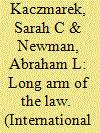

|
|
|
|
|
| Publication |
2011.
|
| Summary/Abstract |
Can the application of domestic law by bureaucracies in powerful states alter policy dynamics globally? Courts and regulatory agencies with jurisdiction over large markets routinely impose national rules to conduct transpiring outside of their physical borders. Such extraterritoriality has expanded to issues ranging from antitrust to the environment. Proponents claim that extraterritorial acts can have far-reaching international consequences, spilling over into the domestic political economy of regulation in target states. Skeptics, however, question the effects of these sanctions against internationally mobile actors. In this study, we offer the first quantitative analysis of extraterritorial intervention for global policy convergence. In particular, we construct an original time-series panel data set to test the association between extraterritorial actions by U.S. prosecutors and the national enforcement of foreign bribery regulations in target countries. Our empirical analysis finds strong statistical evidence linking extraterritoriality to national policy implementation, with jurisdictions that experienced a U.S. intervention being twenty times more likely to enforce their national rules. The findings suggest the important influence that domestic law in powerful states may have for global cooperation in general and sheds light on the key pillars of international anticorruption efforts in particular.
|
|
|
|
|
|
|
|
|
|
|
|
|
|
|
|
| 5 |
ID:
107530
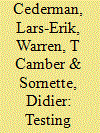

|
|
|
|
|
| Publication |
2011.
|
| Summary/Abstract |
Drawing on Clausewitz's classical theory, we argue that the emergence of mass nationalism following the French Revolution profoundly altered the nature of the units constituting the interstate system, thereby transforming the conduct of interstate warfare. To validate these assertions-and thus to test Clausewitz-we rely on quantitative evidence at the macro level, with a particular focus on the global distribution of interstate war sizes, measured in terms of battle deaths, over the past five centuries. Drawing on extreme value theory, we demonstrate that temporal discontinuities in the shapes of the tails of such distributions can be used to draw inferences about the nature of the mechanisms underlying the bloodiest events in world history. This approach allows us to show that the interstate system experienced a fundamental shift in the mechanisms underlying the production of war sizes: a shift that can be dated to the years 1770-1810, and that resulted in a systematic increase in war severity. These same tools also allow us to rule out a number of alternative explanations for this shift (including changes in population sizes and changes in weapons technology), while providing evidence for a specific account of war severity rooted in the mobilizational capacities of states.
|
|
|
|
|
|
|
|
|
|
|
|
|
|
|
|
| 6 |
ID:
107531
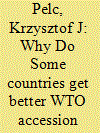

|
|
|
|
|
| Publication |
2011.
|
| Summary/Abstract |
The process by which countries accede to the World Trade Organization (WTO) has become the subject of considerable debate. This article takes a closer look at what determines the concessions the institution requires of an entrant. In other words, who gets a good deal, and who does not? I argue that given the institutional design of accession proceedings and the resulting suspension of reciprocity, accession terms are driven by the domestic export interests of existing members. As a result, relatively greater liberalization will be imposed on those entrants that have more valuable market access to offer upon accession, something that appears to be in opposition to expectations during multilateral trade rounds, where market access functions as a bargaining chit. The empirical evidence supports these assertions. Looking at eighteen recent entrants at the six-digit product level, I find that controlling for a host of country-specific variables, as well as the applied protection rates on a given product prior to accession, the more a country has to offer, the more it is required to give. Moreover, I show how more democratic countries, in spite of their greater overall depth of integration, exhibit greater resistance to adjustment in key industries than do nondemocracies. Finally, I demonstrate that wealth exhibits a curvilinear effect. On the one hand, institutionalized norms lead members to exercise observable restraint vis-à-vis the poorest countries. On the other hand, the richest countries have the greatest bargaining expertise, and thus obtain better terms. The outcome, as I show using a semi-parametric analysis, is that middle-income countries end up with the most stringent terms, and have to make the greatest relative adjustments to their trade regimes.
|
|
|
|
|
|
|
|
|
|
|
|
|
|
|
|
|
|
|
|
|